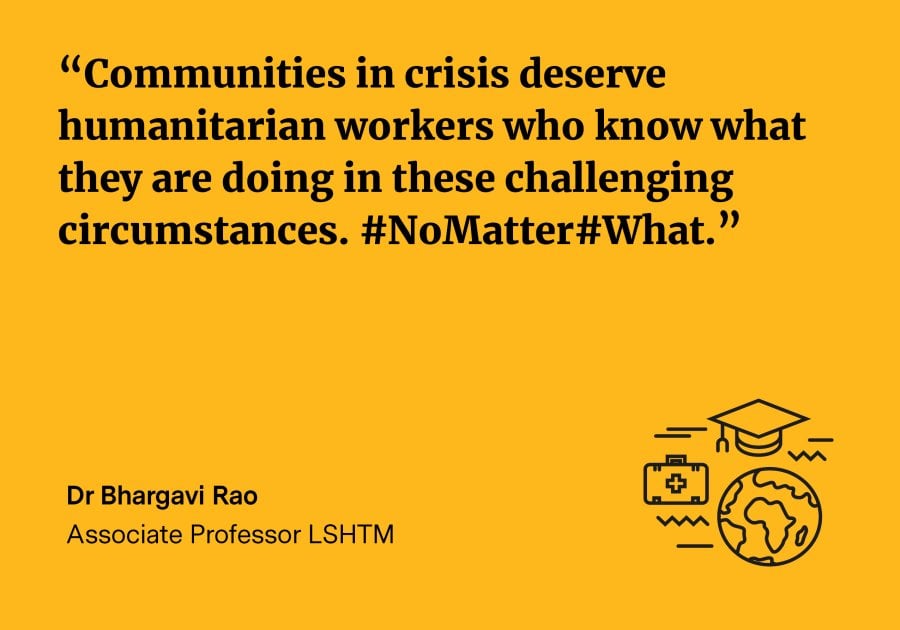World Humanitarian Day: #NoMatterWhat
18 August 2023 London School of Hygiene & Tropical Medicine London School of Hygiene & Tropical Medicine https://lshtm.ac.uk/themes/custom/lshtm/images/lshtm-logo-black.png
The Health in Humanitarian Crises Centre brings together more than 200 members working across a range of disciplines and geographies to improve the health of populations affected by humanitarian crises. Our aim is to generate research collaboratively, for example as part of a multi-disciplinary and international partnership, or using novel methods for co-production, as well as finding innovative ways to overcome challenging situations and generate evidence in a humanitarian context.
For this year’s World Humanitarian Day, we want to showcase the breadth of disciplines and themes members at the Centre work on and take the opportunity to speak to four colleagues and hear what #NoMatterWhat means to them and their work.
“Humanitarians work in stressful contexts and act in an altruistic manner to support communities affected by crises, humanitarian organisations should protect the mental health and well-being of their staff .”
Muhammad Alkasaby, Research Fellow in Mental Health
"Humanitarians usually work in stressful contexts and act in an altruistic manner to support communities affected by the crisis no matter who, no matter where and #NoMatterWhat. Such contexts have a huge impact on the well-being of humanitarian workers; therefore, humanitarian organisations should protect the mental health and well-being of their staff. In the UK Public Health Rapid Support Team (UK-PHRST), we aim to support our staff with their mental health and well-being pre-, during, and after deployment. We also work with our partners to raise awareness of the importance of considering the mental health and Psychological well-being of the affected communities and responders. "
“Communities in crisis deserve humanitarian workers who know what they are doing in these challenging circumstances #NoMatter#What.”
Bhargavi Rao, Associate Professor
"The last year saw record levels of humanitarian need threatening the lives of millions due to rising hunger, violent conflict and damage created by climate change. Communities in crisis deserve humanitarian workers who know what they are doing in these challenging circumstances #NoMatter#What. In 2023/24, we are excited to offer a new programme specifically focussed on the knowledge needed to improve the health of populations or communities affected by humanitarian crises. The aim is to equip people working in humanitarian contexts (or planning to) with relevant skills to critically analyse, design and implement programmes effectively in these settings. We’re really pleased to offer this programme in a distance-learning format so that students globally can study whilst they continue to work, and share their own lived-experiences as part of their learning process."
“Health workers continue to face unsafe and unfair working conditions. We must stand with those who keep us alive and safe day to day. #NoMatterWhat.”
Georgia Venner, PhD student LSHTM
"Health workers continue to face unsafe and unfair working conditions. My recent data collection in the Rohingya refugee camps, Cox’s Bazar, Bangladesh exploring the effects and personal experiences of infectious disease outbreaks starkly highlighted the need for more support and protection to frontline health workers. #NoMatter#What we must stand with those who keep us alive and safe day to day."
“45% of deaths in children under 5 are linked to undernutrition. The highest rates are seen in humanitarian contexts.”
Lauren D’Mello-Guyett, Assistant Professor
"A humanitarian crisis is not just a short event that needs acute response, such crises have long-term and sometimes chronic and generational impact and need continued and long-term response efforts, #NoMatterWhat. There are currently more than 45million children who are wasted, which means they are too thin for height, and 45% of deaths among children under 5 years of age are linked to undernutrition. Highest rates are seen in humanitarian contexts! Our work looking at the environmental risk factors for malnutrition and subsequent relapse post-recovery calls for stronger prevention interventions to ensure children do not initially become wasted and enter the harmful cycle of relapse to acute malnutrition."
LSHTM's short courses provide opportunities to study specialised topics across a broad range of public and global health fields. From AMR to vaccines, travel medicine to clinical trials, and modelling to malaria, refresh your skills and join one of our short courses today.